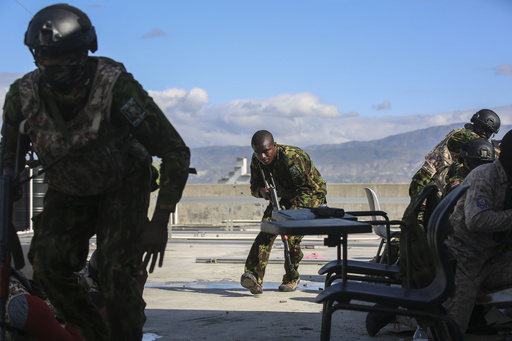PORT-AU-PRINCE, Haiti – An armored vehicle carrying police from Kenya rolls through the streets of Haiti’s capital, its shattered window a clear reminder of the violence that these officers confront on a daily basis. Despite a high-caliber bullet having struck the glass without penetrating, this incident highlights the persistent danger in Port-au-Prince.
Earlier this year, Kenyan officers were sent to Haiti in an effort to help suppress rampant gang violence, but they have encountered ceaseless aggression since their arrival. On Thursday, gunfire erupted as the Kenyan police, alongside their Haitian counterparts, bravely defended against gangs that currently dominate 85% of the city and are engaged in a fierce battle for total control.
Taking cover behind sandbags and a concrete wall at what once served as the National Police’s headquarters – a site now abandoned due to gang pressure – the officers faced a barrage of bullets. Crouched and vigilant, they returned fire while their commander, Godfrey Otunge, expressed determination, stating, “The days are numbered for the gangs. Either you surrender … or we are coming for you.” This resolve underscores the challenges law enforcement faces in Haiti, where more than 4,500 individuals have lost their lives this year alone, and another 2,060 have sustained injuries as reported by the United Nations.
The surge of gang violence has compelled approximately 700,000 individuals to flee their homes in recent years as armed groups continue to loot and destroy communities in their quest for territory. Amidst these troubling developments, criticism of the Kenyan-led mission is mounting, as many point out the lack of significant achievements in reclaiming gang-controlled areas or apprehending gang leaders.
As the police navigate the streets in their battered vehicle, which has witnessed the violence firsthand, they open fire amidst smoldering debris and evidence of brutality, including charred vehicles and grim reminders of past tragedies, such as a burned body alongside a tire. Last week alone, UNICEF reported that around 42,000 people were rendered homeless, half of whom were children. Looking ahead, it is estimated that six million individuals, including 3.3 million children, will require humanitarian assistance in the coming year.
The escalation of gang violence last month has prompted intensified discussions regarding the establishment of a U.N. peacekeeping presence, as nations like the United States emphasize that the current mission led by Kenya is struggling with a lack of resources and funding. This situation continues to unfold in a nation craving stability and security amidst the turmoil.



